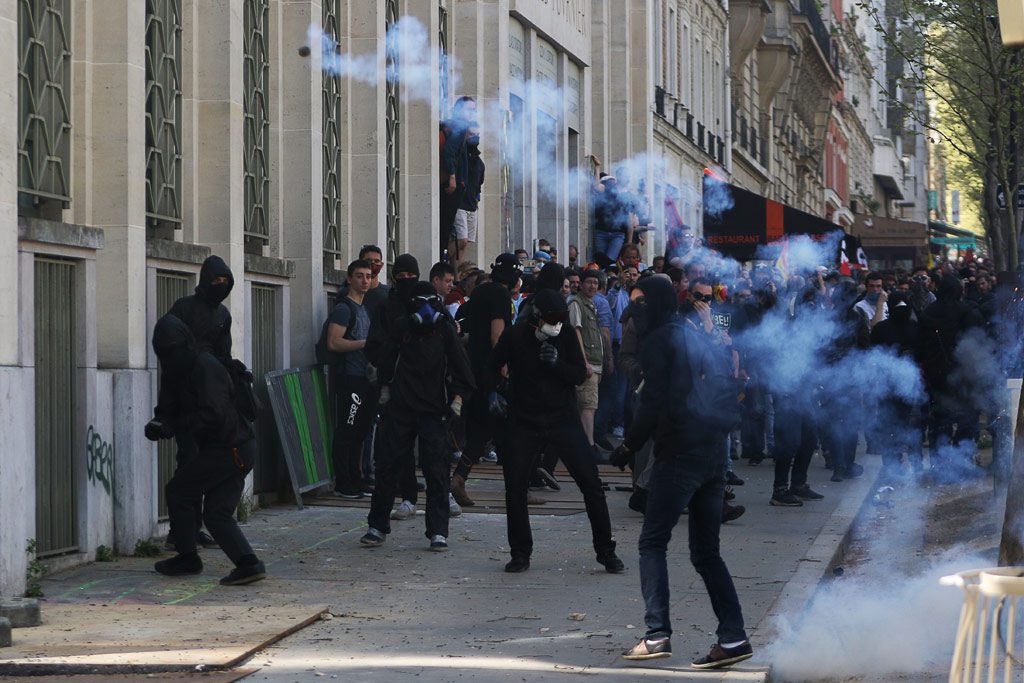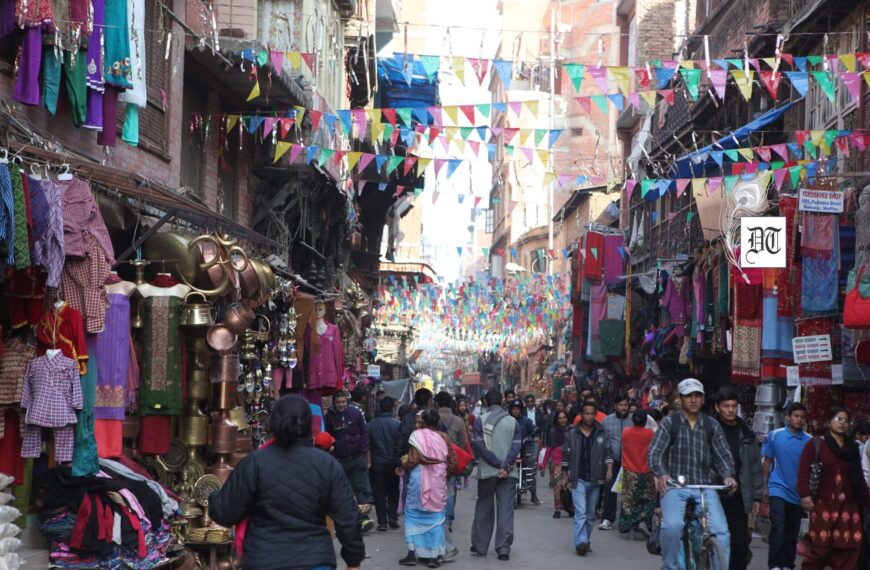Millions of people across France are reliving these momentous events of half a century ago in the most appropriate way: by downing tools and taking to the streets. Once again, universities across the land are under occupation, workers in key sectors are on strike, and mobilisations are drawing together broad sections of people, from the retired seeking to protect their pensions to health workers and Air France pilots furious at their conditions of work. The stakes could not be higher. This month also marks the first anniversary of President Emmanuel Macron’s coming to power. A report, for Different Truths.
Exactly fifty years ago this month, France was aflame. In one of the world’s most developed capitalist economies, the ‘impossible’ – the prospect of revolution from below – struck suddenly with resounding force, fury and festivity. Students and workers in their millions spilled onto the streets, closing factories, occupying campuses and triggering the biggest general strike France has ever known. The government of the day, headed by President Charles de Gaulle, was plunged into panic.
Today, millions of people across France are reliving these momentous events of half a century ago in the most appropriate way: by downing tools and taking to the streets. Once again, universities across the land are under occupation, workers in key sectors are on strike, and mobilisations are drawing together broad sections of people, from the retired seeking to protect their pensions to health workers and Air France pilots furious at their conditions of work. On the radical, anti-capitalist Left and across the sweep of trade union fighting power, one slogan reigns: convergence of struggle!
The stakes could not be higher. This month also marks the first anniversary of President Emmanuel Macron’s coming to power. In the office, Macron has wasted no time in pushing ahead with his extreme neoliberal agenda. Project Macron envisages a radical remodelling of the French economy, along with a new strategy for French capital within the EU. Its economic strategy can be characterised as pro-neoliberal, anti-worker and nationalistic.
On the domestic front, the goal is the macho one of replicating Thatcher-style ‘achievements’ on tough French terrain: tax cuts for the rich, benefit cuts for the poor, the targeting of rights and protections won by workers over decades of struggle and the dismantling and privatisation of a still extensive and robust public sector. Macron also hopes to curtail the militancy of French students by restricting access to higher education.
Over the past year, Project Macron has notched up several successes, helped by the particular nature of the election ‘victory’ won by Macron and his ‘third way’ movement La Républiqueen Marche! (LREM). In June 2017, after multiple rounds of voting, France found itself governed by a president voted in by just 16 percent of the electorate, shored up by an overwhelming parliamentary majority in the National Assembly (the lower house of parliament) gained through elections in which 6 out of 10 voters did not participate.
Rather than constituting an antidote to voters’ disenchantment with mainstream politics, Macron’s rise can be seen as a default position, expressive of voter sullenness and alienation alongside popular revulsion for Marine Le Pen, his opponent in the run-off round. While LREM’s domination of the National Assembly (it holds 350 out of 577 seats) has given Macron a potent advantage when seeking to implement his programme, the feeble democratic foundations of his regime keep showing through. When faced with serious opposition, Macron’s instincts are to close down debate and ram things through. Over the past year, he has repeatedly invoked Article 40, an obscure feature of France’s 1958 Constitution, to impose his will by decree.
By late February speeches by Macron and Philippe clarified the situation beyond doubt: the goal was to smash, once and for all, the statut de cheminot, and with it the formidable organisational strength and reach of France’s railway workers.
To look back at the history of French working-class struggle is to find the cheminots repeatedly at the vanguard of action: a combative, well-organised frontline, conscious of their class strength and ready to reinforce and sustain wider trade union and social movements. Back in 1968, rail workers struck work in solidarity with the student uprising. In 1995, cheminots played a central role in the great wave of strikes that greeted Prime Minister Alain Juppé’s plan of attack against the public sector. In the context of weeks of national shutdown, culminating in a million-strong nationwide strike on December 12, 1995, Juppé was forced into humiliating retreat.
Macron no doubt hears the call of destiny in the battle currently shaping up. As if taking his inspiration from Thatcher’s war on the miners, the youthful president sees it as falling to him to smash the cheminots once and for all, clearing the way for a wider assault on France’s public sector.
Fortified by his success last year in forcing through labour law reforms, Macron may also be banking on continuing divisions among his opponents in the trade union movement and the political Left. But here he may have miscalculated. Recent weeks have seen a powerful coming together of trade unions and the Left, a resurgence of unified action.
A key development took place in Paris on March 21, when representatives of twelve Left organisations came together to take questions from journalists. Those taking turns at the mike included representatives of La France Insoumise (France Unbowed, currently by far the biggest and most effective force on the Left), the Nouveau Parti Anticapitaliste (NPA), the Parti Communiste Français (PCF), and Europe Ecologie-Les-Verts. All pledged the commitment of their organisations to unified action in defence of France’s public sector.
At the trade union level, too, there is unity in the air. All four federations representing railway workers were able to reach agreement on a strike schedule: a timetable of rolling two-day strikes (each followed by three days of normal functioning). Set in motion on April 3, the rolling strikes are having a major disruptive impact on both passenger and freight services; while participation in the action has fluctuated (drivers and guards are proving particularly stalwart adherents), the economic fall-out is generating an alarm in business and industry circles.
Meanwhile, days of rolling strikes by airline workers at Air France have cost the bosses more than 300 million euros. Share prices are falling, and a miserly ‘new’ pay deal put forward by the company was thrown out by workers, prompting the managing director to resign.
Worker power is visibly present across the country. Railway workers have occupied motorway toll booths and let cars through free, in the process collecting donations for the strike fund. An online railway workers strike fund has raised over a million euros, indicating robust popular support for the strikes, despite formidable government and mainstream media efforts to turn public opinion against the cheminots.
Resistance is manifesting itself at many different levels and in a diversity of forms. In early May, the national mood found expression in a giant outpouring of irreverence: a mock ‘party’ held in Paris to mark Macron’s first year in office. Mass meetings, occupations, blockades and anti-Macron events are enlivening university campuses across France. At Nanterre, the birthplace of the May 1968 student movement, weeks of the blockade has prevented exams from taking place, resulting in progressive lecturers vowing to give high ‘political grades’ to all students.
On May 26, a tidal wave of revolt swept across France. This has been set in motion by the coming together of the CGT and La France Insoumise: a historic fusion of trade union might with radical Left politics. Jean-Luc Mélenchon, the combative leader of La France Insoumise who last year rose from nowhere to gain close to 20 percent of votes in the first round of the presidential polls, is already talking about the formation of a Popular Front. France’s long, hot summer has only just begun.
Susan Ram
Courtesy: People’s Democracy Weekly
©IPA Service
Photo from the Internet





 By
By

